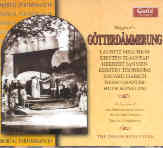This “complete” Götterdämmerung almost makes you appreciate technology, or at least what technology can do. It is a compilation of bits of other Götterdämmerungs, artfully joined together (only the most sophisticated among us would notice the “joins”). We get parts of performances from the Met led by Artur Bodanzky (1936, 1939) and Fritz Stiedry (1951); Covent Garden led by Wilhelm Furtwängler (1937); La Scala led by Furtwängler (1950); and some other recordings of excerpts. In all, there are eight sources and 177 joins. The sound quality varies from really okay to scratchy and difficult; but that’s hardly the point. Neither, apparently, is an overall view of the opera: it’s not easy to discuss a dramatic arc or interpretation when Bodanzky has Siegfried and Brünnhilde comfy and quick and then Siegfried speedboating down the Rhine in the prelude; or when Furtwängler’s gravity shows up in the hero’s Funeral Music and the Immolation Scene while Stiedry tends to be formal and to-the-point elsewhere. But who cares? The singing is staggering; those who claim that the golden age of Wagner singing is long gone are absolutely right.
Kirsten Flagstad is uniformly great, over a period of 15 years. Her delivery is as smooth and noble early as late, and all notes are perfectly in place. Oddly, she ducks the high-C that ends the Prologue in 1939! She also is not quite maniacal enough in Act 2–other sopranos have expressed rage-at-betrayal better–but still, the voice is reassuring in a way that no other’s was in the 20th century. The Immolation Scene, from ’37 with Furtwängler, is just about perfect. And Lauritz Melchior is absolutely unique; the combination of power, legato, tonal beauty, and–despite some critics’ complaints to the contrary–involvement have not been matched within memory. His death scene is incredibly touching.
Kerstin Thorborg gives Waltraute’s narrative an urgency that makes it riveting where many singers simply make it seem long, and her tone is a combination of creamy and urgent. Herbert Janssen’s Gunther is ideal–a semi-dolt to whom things happen–and he sings beautifully. Dezso Ernster’s Hagen is colorful and pointedly delivered, but a darker, meaner sound (Frick, Weber) is preferable in the role. Eduard Habich’s Alberich is almost completely unhinged; he could scare the horses.
Hilde Konetzni is a truly pristine, unsuspecting Gutrune (Maria Nezadal sings some of Gutrune’s music and Regina Resnik sings 19 words that neither of the other two sing). The Norns and Rhinemaidens are top-notch (Lucielle Browning, Doris Doe; Erna Berger, Lucina Amara), and it’s a particular modern miracle that the latter are taken from 1951 while Siegfried’s interactions with them are taken from 1936! I can’t say that this feels like a whole performance of this opera, but neither can I say it does not. Is it the “dream” performance? I don’t know, but it’s a set that Wagnerites will need. [2/17/2003]
































